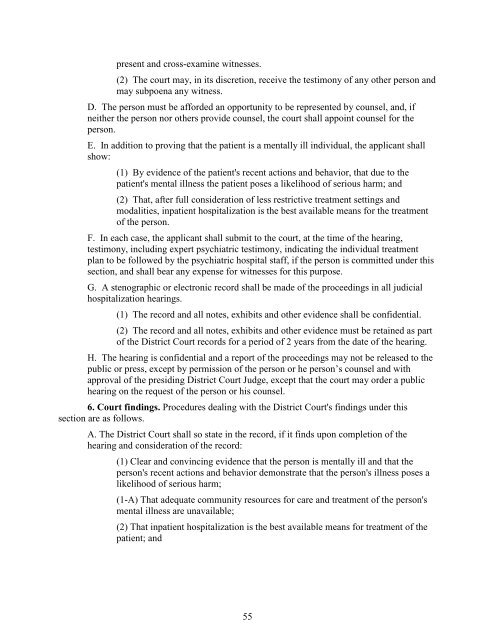involuntary hospitalization and outpatient services laws - Disability ...
involuntary hospitalization and outpatient services laws - Disability ...
involuntary hospitalization and outpatient services laws - Disability ...
Create successful ePaper yourself
Turn your PDF publications into a flip-book with our unique Google optimized e-Paper software.
present <strong>and</strong> cross-examine witnesses.<br />
(2) The court may, in its discretion, receive the testimony of any other person <strong>and</strong><br />
may subpoena any witness.<br />
D. The person must be afforded an opportunity to be represented by counsel, <strong>and</strong>, if<br />
neither the person nor others provide counsel, the court shall appoint counsel for the<br />
person.<br />
E. In addition to proving that the patient is a mentally ill individual, the applicant shall<br />
show:<br />
(1) By evidence of the patient's recent actions <strong>and</strong> behavior, that due to the<br />
patient's mental illness the patient poses a likelihood of serious harm; <strong>and</strong><br />
(2) That, after full consideration of less restrictive treatment settings <strong>and</strong><br />
modalities, inpatient <strong>hospitalization</strong> is the best available means for the treatment<br />
of the person.<br />
F. In each case, the applicant shall submit to the court, at the time of the hearing,<br />
testimony, including expert psychiatric testimony, indicating the individual treatment<br />
plan to be followed by the psychiatric hospital staff, if the person is committed under this<br />
section, <strong>and</strong> shall bear any expense for witnesses for this purpose.<br />
G. A stenographic or electronic record shall be made of the proceedings in all judicial<br />
<strong>hospitalization</strong> hearings.<br />
(1) The record <strong>and</strong> all notes, exhibits <strong>and</strong> other evidence shall be confidential.<br />
(2) The record <strong>and</strong> all notes, exhibits <strong>and</strong> other evidence must be retained as part<br />
of the District Court records for a period of 2 years from the date of the hearing.<br />
H. The hearing is confidential <strong>and</strong> a report of the proceedings may not be released to the<br />
public or press, except by permission of the person or he person’s counsel <strong>and</strong> with<br />
approval of the presiding District Court Judge, except that the court may order a public<br />
hearing on the request of the person or his counsel.<br />
6. Court findings. Procedures dealing with the District Court's findings under this<br />
section are as follows.<br />
A. The District Court shall so state in the record, if it finds upon completion of the<br />
hearing <strong>and</strong> consideration of the record:<br />
(1) Clear <strong>and</strong> convincing evidence that the person is mentally ill <strong>and</strong> that the<br />
person's recent actions <strong>and</strong> behavior demonstrate that the person's illness poses a<br />
likelihood of serious harm;<br />
(1-A) That adequate community resources for care <strong>and</strong> treatment of the person's<br />
mental illness are unavailable;<br />
(2) That inpatient <strong>hospitalization</strong> is the best available means for treatment of the<br />
patient; <strong>and</strong><br />
55


